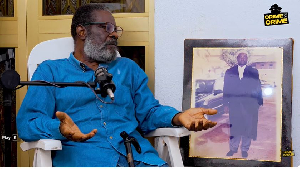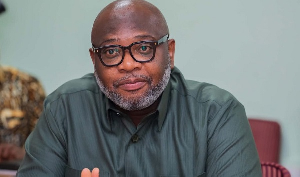With few months for Ghana’s first oil to go to the international market, the expectant economy has witnessed no short of worrying signals that together could form the powerful strands that contributes to the resource curse. It is as if scattered examples of financial improprieties, devastated environments and tattered social compacts in resource-dependent countries especially in Africa have not sparked any sense of urgency toward laying down appropriate strategies. Verbal proclamations and commitments are made to the effect that Ghana will elude the resource curse. Meanwhile, the reality on the ground shows a wide difference. The deserving question to pose is that is Ghana really ready to avoid the resource curse.
The first case at hand has been the brawl that has shrouded the payment of US$35 million imposed on Kosmos by the ministerial committee for the alleged spillage of 706 barrels of toxic substance into the sea. The stance by Kosmos to refuse payment of the fine never occurred to me as a surprise. After all, this is well characteristic of resource-rich countries with weak or no regulatory frameworks and laws but has purposed to fast-track extracting resources to complement poverty reduction efforts. With its inherent technicalities, it is no wonder the issue has gone into abrupt silence. What should be expected? Is Kosmos ready to pay or to seek for a reduction? Or better still, are we going to experience the law application tussle? This I will leave for individual cogitation.
Checking Worrying Signals
What has further worsened these worrying trends in the emerging hydrocarbon industry is the recent release of the Revenue Watch Index of which Ghana had an average score of 32.3 out of a possible 100. The Revenue Watch Index is the first attempt to measure and compare the information governments disclose about the oil, gas and mining industries, including payments to those governments, contracts, regulations and related data (2010 Revenue Watch Index. Transparency: Governments and the Oil, Gas and Mining Industries by the Revenue Watch Institute and Transparency International). The Revenue Watch Index which straddles seven key areas of natural resource management stresses the importance of good governance to various governments. The areas covered included, access to resources; generation of revenue; institutional setting; state-owned companies; natural resource funds; sub-national transfers; and the Extractive Industry Transparency Initiative (EITI). Brazil led the index with a remarkable score of 97.0 followed by Norway with 96.4 score. The bottom recorded countries like Equatorial Guinea (with a score of 11.6) and Turkmenistan (a score of 9.7). Interestingly, they are on the same category with Ghana. Clearly, one is not far from right to say that the index has even been fairer to Ghana. In other words, the country deserves what it had. By implication, the score means that Ghana is 77.7 deficient in ensuring good governance in the extractive sector.
The fact that Ghana fell in the bottom category of Scant Revenue Transparency (with average score 0-33) should provide the impetus for urgent rethinking of the oil before commercial production commences in less than two month. Treating revenues as sacred and confidential has actually been the bane of developing substantive governance structures in the extractive sector. Ghana’s poor performance of the index best illustrates the inherent challenges that face the extractive industry including the emerging oil and gas sector. The obscurity at which revenues from the mining sector move from companies to governments accounts for this abysmal performance. Despite the few disaggregated revenue reporting in the mining industry, financial plunder is commonplace.
Considering the critical role the extractive industry plays in the economy, it is difficult to understand why Ghana hesitates in undertaking governance reforms. The country is now few months away from the first pump of commercial oil into the international market. The worrying issue now is that laws to govern exploration and production and the management of oil revenues are yet to be passed by parliament and this should not be done with haste. Else we will spell intractable challenges for the country when oil companies identify and capitalize on loopholes.
What makes changes in the extractive industry even more crucial is that Kosmos Energy’s refusal to pay the fine has set a bad precedent for the country. Also moving with Equatorial Guinea, Democratic Republic of Congo, Saudi Arabia and others at a start of a tough journey in the oil exploitation is not proper for Ghana. We should rather link up with the experiences of Norway, Canada, Trinidad and Tobago, Brazil and Liberia (that scored incredibly higher than Ghana with 60.5).
Now, let’s get down to brass tacks. The major difference between BP’s catastrophe in the Gulf of Mexico and Kosmos’ spill apart from its physical scale is that with the BP oil spill “the environmental costs of extraction occurred within a jurisdiction where the perpetrator had legal liability for them”. Kosmos has taken a technical argument for its spill because there are no laws to hold them culpable for their negligence. Kosmos’ decision underlines the fact that Ghana is weak in its law enforcement as it’s already happening in the mining sector. This could send a wrong signal to the other jubilee partners. We cannot realize prudent management of extractive industry revenues if we continue to regard revenues and contracts as sacred. The ethical imperative that should move the country is that the revenues belong to the people and as such they reserve the right to demand how they are been expended. This cannot be possible when they are not made to know exactly what companies pay to the government and how government uses those revenues. This is what Paul Collier regards as the agency problem - “ordinary citizens cannot readily control what their representatives, politicians and officials get up to”. There is no doubt that the information asymmetry has been the huge advantages that companies have in knowing the true value of prospecting rights and the diverse ways in which they conceal true profits.
Instituting Ideal Solutions
The ideal solution is a well informed citizenry. Whether the discovery of oil would lead to a meteoric ascent out of poverty or violent plunder and environmental disaster depends entirely on the choices we make. It is needless to declare contracts and revenues as confidential. The poor performance of the Revenue Watch Index should serve as the platform for pursuing rational change.
The publications of disaggregated reports on mining revenues especially for the latest 2008, is a right place to start. This however should not end there. The basic tenets of the Extractive Industry Transparency Initiative (EITI) can be easily extended to the oil sector. Again, I would urge political leaders and other stakeholders involved to make goods choices for the country in relation to the Natural Resource Charter which identifies best practices for natural resource management. Ghana needs an independent regulatory body in both the upstream and downstream oil sectors to complement the efforts of the Environmental Protection Agency in ensuring environmental compliance by jubilee partners. We should create a jurisdiction where companies that spill would have legal liability for the costs involved.
The mandate of the Public Interest and Accountability Committee (formerly the Public Oversight Committee) under the Petroleum Revenue Management Bill should be made to cover the publication of oil revenues and contracts. The Committee, according to Section 54 of the bill is now charged with monitoring compliance with the Act, creating the space and platform for public debate on “whether spending prospects and management of revenues adhere to development priorities,” and providing independent assessments to help Parliament and the executive in the oversight and performance of revenue management programs. The mounting calls for openness in oil production agreements are not only justifiable by law but also recipe for prudent oil revenue management and sound practices in the extractive industries.
It should also not be forgotten that a new tool for public oversight has been handed down to impress on the right standards in the country’s extractive industry. This is the passage of the new law by US Congress as part of the provisions in the Dodd-Frank Wall Street Reform and Consumer Protection Act. Under this, companies registered with the Securities and Exchange Commission (SEC) will publicly report how much they pay governments for access to their oil, gas and minerals. This new historic twist should empower the people of Ghana to seek for accountability in revenue usage.
It is refreshing, according to the Public Agenda Newspaper report on October 22, 2010, that Ghana is now EITI Complaint. This should be the springboard for increased reforms in the emerging oil sector and the mining sector to allow revenues to trickle down to the ordinary people.
Conclusion
The worst-case scenario that Ghana is gradually losing sight of the fact that natural resources and for that matter oil can generate huge liabilities should not be created. The dreadful impact of the resource curse is never a mythology. Nigeria, our closest neighbor is battling for sufficiency and appropriateness with its oil resource. The plunder of nature where the few can expropriate what should belong to the many would be undesirable for the economy. It is against this backdrop that the basic tenets of transparency should be established at the very beginning. The government should show keen interest in transparency initiatives especially for contracts and as such demonstrate convincing readiness to embrace laid-down international standards. Ghana therefore ought to be on the qui vive!
This article supports the campaign to reduce the number of poorest societies in the world “home to the bottom billion” (the idea developed by Professor Paul Collier) especially in Africa. Rethinking Ghana’s oil to avoid the resource curse could well contribute to the reduction.
The author, Stephen Yeboah is a freelance writer and the National Co-ordinator for Osagyefo Network for Rural Development (OSNERD), an NGO based in Kumasi [email: stephenyeboah110@yahoo.com]
Opinions of Wednesday, 27 October 2010
Columnist: Yeboah, Stephen














